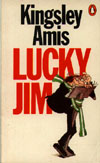
I must be on some kind of roll in my mainstream reading. First was the exciting revelation that Robertson Davies wrote the types of books that appeal to me in the same way that Jonathan Carroll’s do, then came the surprise that Vladimir Nabokov was as clever as Jorge Luis Borges, yet wrote at longer lengths. If Lucky Jim is any indication, now I’ve just discovered an author who combines the plotting skill of P.G. Wodehouse with the detail of Davies. My lord, three great new authors in one year–I’m not sure if I can handle it.
Lucky Jim doubles as a book of high humor and as an attack on the staid British university system of its time (and maybe beyond–I’m no expert in its complexities). For me, it succeeds best in its first role, but that may be because if has lost some of its bite in the intervening years since its first publication. Jim Dixon, the title character, is a new lecturer in history at a mid-sized college. He finds the work almost stultifyingly boring, but the real horror is trying to achieve tenure when faced with Welch as his immediate superior. And then there’s Margaret, his girlfriend, although he can’t quite remember how she came by that designation, who, although pleasing enough to look upon, seems destined to be always upset with him, which is dangerous, since she tried to commit suicide when her last beau left her suddenly.
Imagine Wodehouse writing a Wooster/Jeeves novel in which Jeeves becomes pure blind luck, Aunt Agathe is split into component irritations, and Bertie is a young teacher with a taste for drink and a bit of a chip on his shoulder. Then exchange the fantasy 1920s setting with a realistic early 60s one. The result is as fabulous, funny and appealing as a well-written Mad TV or Monty Python skit.
On the strength of this novel, Amis became a spokesman for a generation of “angry young men.” I’m not qualified to comment further on that, which means I need to do some self-education on the British novel in the 1960s. Amis seems to have been the Kurt Vonnegut equivalent for Britain, that is, a novelist whose social commentary was stronger than the genre in which their books were based, which landed them with a mainstream audience. Just looking at some of his other titles reveals that Amis had an affinity for popular literature, even though his was never ghetto-ized. I’m hoping that some of his other books, like The Anti-Death League, will be as rewarding as this.
[Finished 10 October 1997]
